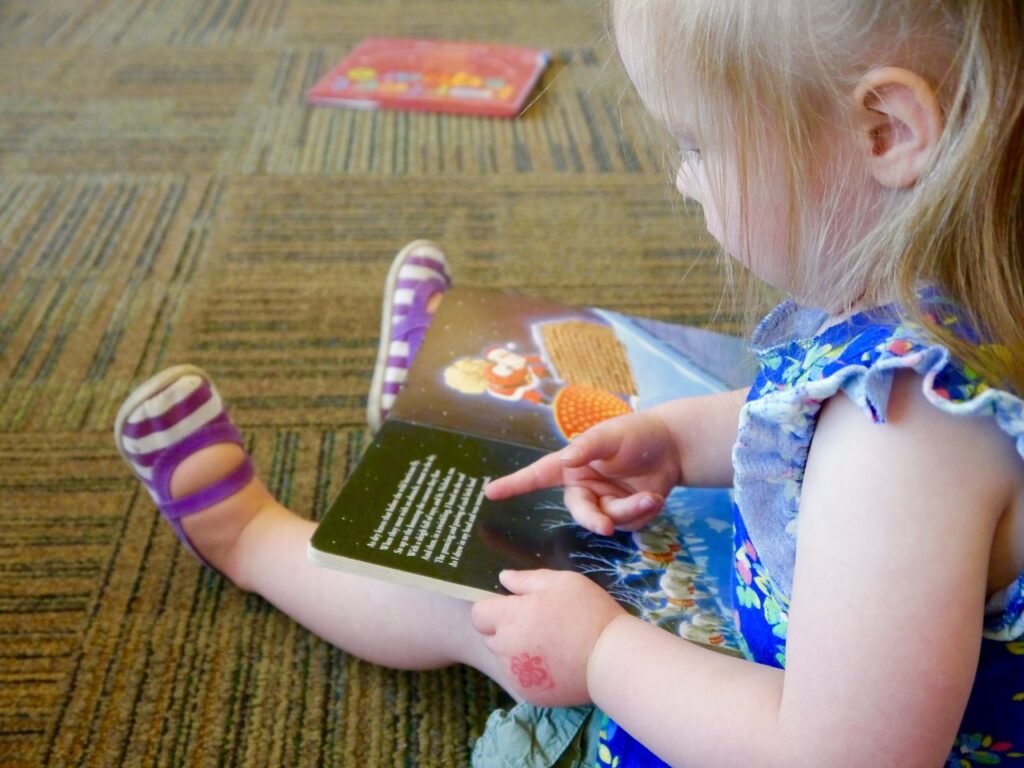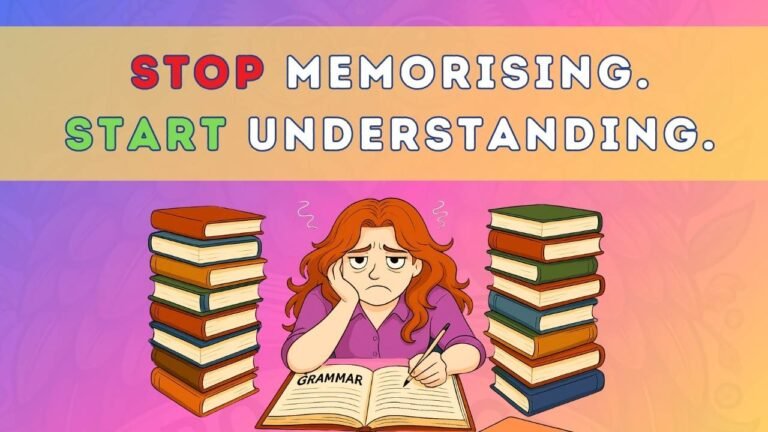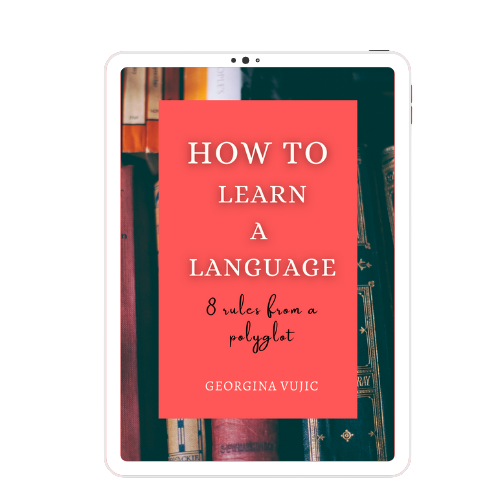If you’re just starting your language learning journey, chances are that you’ve seen many courses and language learning apps coaxing you with promises of mastering a second language in the same way a child does: through passively listening, interaction and play-like activities.
This way of studying a language is called the immersion method because you’re immersed in a ‘language bath’ in the same way little children are. This method is reinforced by activities based on repetition of words and phrases.
Sounds easy, right? But does this method really work for adults?
To answer this question, we ought to ask ourselves how a child soaks up complex linguistic processes in the first place?
There’s no definite answer, as much of science revolving around brain is veiled in mystery, but let’s take a look at one of the theories.
HOW DO CHILDREN ACQUIRE LANGUAGE? LET’S ASK A LINGUIST

According to Noam Chomsky, a prominent American linguist, children do absorb a massive number of words but rather than parrot them back, they abstract rules from them to create new sentences they have never heard before.
The so called critical period for a child to do that is from the age two to seven; during that time, any child exposed to any of the world’s languages will master the language.
Hence this is called the nativist approach, suggesting that language is an innate faculty based on the pre-existing set of rules in our head Chomsky refers to as ‘Universal Grammar.’ For example, 75% of the world’s languages use the typical word order which is as follows:
SUBJECT -VERB-OBJECT
The girl ate apple
CHILDREN LEARN THROUGH IMMERSION

Chomsky firmly stated that if a Martian linguist were to visit Earth, he would deduce that all of the world’s languages were just variants of one and the same language, and one of these reasons is the ease with which children acquire their mother tongue.
The key word here is acquire – following the nativist theory, children do so through Language Acquisition Device that enables them to pick up grammar and syntax (the order of words and phrases in a sentence) without any formal teaching.
Nowadays, we call that the immersion method when speaking about children and adults alike learning their first and second language, respectively, simply by being constantly exposed to it in everyday situations.
This usually means two things: you can either move to the country of your target language or you can recreate that surrounding artificially, through enrolling children in bilingual schools, or through listening music, watching movies, reading newspaper if you’re an adult.
Therefore, this method suggests that you can acquire a second language in the same way as your mother tongue with a little help from apps based on repetition of phrases and occasional conversational sessions with native speakers.
But is this really possible? We’ve already learned that there’s the so-called ‘critical period’ during which a child can acquire a language.
So what changes after that period and why does it seem harder to learn a language when older?
WHY IS IT HARDER TO LEARN A LANGUAGE WHEN OLDER – AND WHY THAT’S NOT A BAD THING

Maybe you’ve already tried to immerse yourself fully in a foreign language; you’ve been constantly listening to the radio, watching TV, uttering sentences with the help of one of many apps out there, and yet, you’ve come to the point where you feel confused and frustrated because you can see that you haven’t advanced as much, nor gained independence – the ability to form cohesive sentences on your own.
We’re here to reassure you that there’s nothing wrong with your linguistic abilities at all.
There’s this famous quote by Albert Einstein that goes:
‘Everybody is a genius. But if you judge a fish by its ability to climb a tree, it will live its whole life believing that it is stupid.
Albert Einstein
So why are the adults that try the immersion method like a fish trying to climb a tree?
If immersion alone works, why don’t first generation immigrants speak the local language perfectly even after decades of immersion? Why is it only their children that speak fluently and parents usually speak a “broken” idiolect or a hybrid mixture of two languages, never quite successfully isolating the two systems in their minds?
Whereas children may call upon the Language Acquisition Device to learn their first and even their second or third language during the critical period, adults and teenagers need to use a different methodology, they need a methodology to begin with, they need to consciously separate the two linguistic systems – their mother tongue and the target language. This is achieved through education and learning with understanding.
Adults need not only learn their target language, but also learn about their target language, due to the fact that our brains are simply different at that stage.
Acquiring a language might not come as easy and natural as it does to children, however, there’s one important advantage that you, as an adult, have over children.
ADULTS LEARN WITH UNDERSTANDING

You learn with understanding and are able to explain the ‘why’ in a language.
How well would you be able to explain the grammar of your own language to a foreigner?
Are there some common mistakes that you and your compatriots make?
This is because we don’t acquire our first language on a conscious level – we’re actually more likely to know the grammar of our second language better, understand the processes behind it, and implement it with confidence that we earned.
So while it might seem harder to acquire a language when we’re older, this is purely due to the fact that we’re:
a) a lot busier than a baby who spends most of the time absorbing the world around them
b) even if we had plenty of time on our hands, our brains work differently, so we need to adjust our methods accordingly
and
c) we’re swamped with tempting offers based on the immersion method that simply don’t work.
You might think to yourself:
‘But I saw this man on TedTalk, swearing that he was able to understand and speak basic Chinese after spending a night on a train communicating with a native speaker using hands and arms.’
This might be true for that person, but bear in mind that there will always be exceptions to the rule, but they are just that – exceptions.
There are rare individuals whose brains are wired differently and who are able to acquire a language very quickly, but let’s be realistic, that’s not most people and there’s nothing wrong with that either – just remember the Einsten quote.
WHY IS IMMERSION METHOD SO POPULAR?

You might then wonder – so if this method doesn’t work for most people, why is it still so popular? The quick answer to that would be: because it sells. Quick courses generate high turnover. Let’s take a look at some of the reasons behind it:
There are very few people who wouldn’t describe their work place as ‘fast paced.’
In fact, it’s one of the first adjectives that spring to mind for most. We’re taught and expected to deliver quickly and efficiently even with a tight deadline.
This has shaped our culture and our way of perceiving the world – so it is completely natural to look for quick and easy solutions to our life – and the market is more than happy to offer what sells.
Another reason is that language learning is now more in demand than ever: in our globalized world, we need languages for travel, work, leisure, because our partner is a foreigner, because we want to reconnect with our ancestors, etc.
Parents enrol their teenagers in language schools because they want to give them that advantage in life and adults often need to move to another country for work.
KNOW YOUR NEEDS AND CHOOSE YOUR EDUCATION PROVIDER WISELY

So which one of these is your reason for wanting to learn a new language?
If you just want to go to Spain and be able to order a coffee in Spanish, then one of those quick courses and language apps will work just fine for you.
If you, however, want to become fluent in a second language, you’ll need more than that.
HOW WE DO IT

At Romance Language Centre, we believe in learning with understanding and giving honest feedback.
Our standards are high but the outcomes are realistic and well-earned.
We believe that successful language acquisition for most adults, one that will result in lifelong linguistic independence and fluency, takes time, dedication and hard work.
We understand how a language works and we want to pass on that knowledge to you: we want to make you fall in love with the language you wish to learn.
To read some of our tips on how to learn a language, truly, subscribe to our newsletter and receive a FREE ebook:















